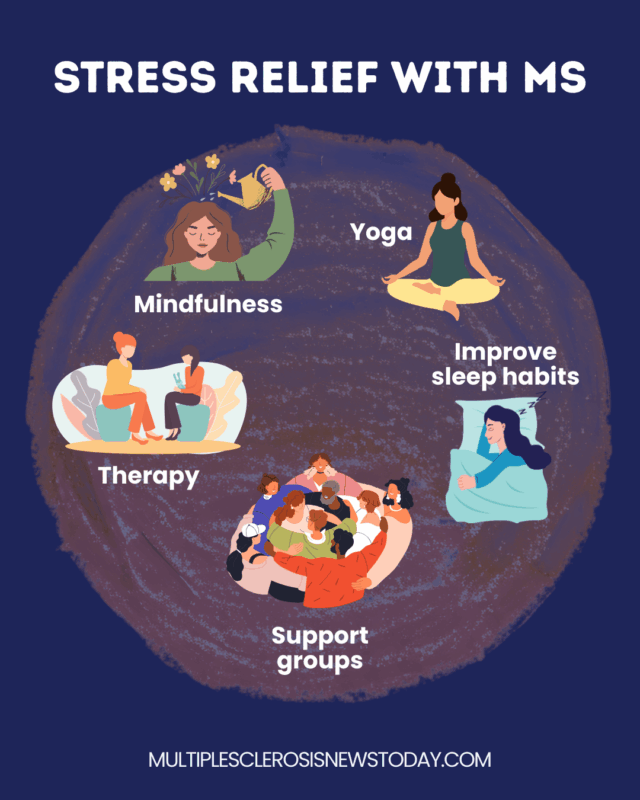
Stress and MS: Strategies for finding relief
Last updated Feb. 17, 2025, by Agata Boxe

Living with multiple sclerosis (MS) can be stressful as the disease can affect both your physical and mental well-being.
MS is a chronic autoimmune disease that impacts the nervous system. It often causes fluctuating symptoms such as fatigue, muscle weakness, pain, and cognitive issues. While scientists do not know the exact cause of MS, they believe genetic and environmental factors play a role.
Although some people may feel that stress can worsen their MS symptoms, there are ways to try to lessen its potential impact on your well-being. These include mindfulness, exercise, and mental health support.
How stress affects MS
Stress from having an MS diagnosis and how it can change your life can worsen MS symptoms and increase the risk of MS relapses, creating a cycle of stress-induced health problems.
While the connection between stressful life events and the likelihood of developing MS has been studied, no solid evidence has proven that a stressful event causes MS — although it may trigger its onset.
However, studies on MS and stress have shown that when you already have an MS diagnosis, continuous stress is a risk factor for an MS relapse — meaning there is a relationship between stressful events and an MS exacerbation.
Even when you’re not experiencing MS flare ups, stress also can worsen certain symptoms of MS, such as fatigue, anxiety, depression, and sleep disturbances.
Common stress triggers for people with MS include:
- unpredictability of MS symptoms and flare-ups
- mobility challenges such as difficulty walking and maintaining balance
- difficulty managing work and family responsibilities due to MS symptoms
- challenges due to the invisibility of some symptoms
- the financial toll of the disease
- the potential impact of MS on memory and cognition.
Certain groups of people with the disease may be more vulnerable to additional sources of stress. For example, research suggests that for Black Americans with MS, racial discrimination can contribute to stress and health disparities.
Signs of stress
Increasing irritability or sleep issues may be a sign that you are experiencing MS-related stress. Being able to recognize these signs can help you manage the impact of stress on MS symptoms and protect your physical and mental health.
In MS, signs of stress can be both physical and emotional and include:
- feeling irritable, resentful, or overwhelmed
- experiencing excessive nervousness or anxiety
- worrying a lot and expecting the worst to happen
- finding it challenging to make decisions
- experiencing worsening fatigue and muscle spasms
- sleeping too little or too much
- having headaches, cramps, or dry mouth.
Practical strategies for stress relief
While MS and stress can impact many aspects of your life, you can try to counter it by practicing mindfulness, consulting a therapist, and addressing sleep issues. Exercising and changing your diet may also help reduce the role of stress in MS symptoms.

Mindfulness and meditation
Mindfulness meditation and breathing exercises have been shown to lower stress in people with MS, while also having other mental health benefits such as helping manage anxiety and depression and improving quality of life.
To get started with mindfulness meditation, you can find relevant apps on your phone or try free videos on YouTube. Some MS associations also have programs that teach you meditation techniques to help with stress management.
Breathing exercises may also help you feel more at peace.
One option to possibly try is deep breathing, where you slowly breathe in through your nose and then slowly exhale through your mouth. Or you can try belly breathing, where you place one hand on your abdomen and feel your belly rise as you inhale and flatten as you exhale.
Yoga and gentle exercise
Managing an MS diagnosis — along with the fatigue that affects many people with the disease — can leave you exhausted, which can make the idea of exercising seem overwhelming. But trying yoga or other gentle exercises can have unexpected benefits by alleviating stress and improving your overall well-being.
Yoga has been linked to less fatigue in people with MS. Since fatigue from the disease is a common source of stress, anything you do to relieve it can help you feel more relaxed.
In general, movement can help relieve stress by increasing the production of mood-boosting endorphins, lowering the levels of stress hormones, and possibly distracting you from negative thoughts.
Other exercise options for MS include walking, stretching, tai chi, swimming, rowing, and strength training.
You should consider working with a physical therapist to create an exercise program that is best for you and your MS symptoms since they vary from person to person. Ideally, find an exercise you enjoy so you will be more likely to keep doing it.
Emotional and social support
Dealing with the symptoms of MS and the stress that often comes with the disease can be difficult to do on your own.
Family members and friends can be a good source of support, but at some point you might need more.
Talking to a therapist or joining an MS support group can help you find strategies that help you manage stress and other challenges of living with the condition.
A mental health professional can also help you with understanding your psychological responses to an MS diagnosis. You may be grieving the loss of abilities, such as being able to walk without stumbling, or frustrated by symptoms that interfere with your daily life, such as fatigue or cognitive issues.
Look for a therapist who has experience in treating people with chronic diseases or who has a chronic condition. They may be able to better understand what you are dealing with, including the relationship between MS and emotional stress.
Ask your doctor or reach out to MS support groups for recommendations.
Meeting other people with MS through MS support groups — both in person and online — can also be an invaluable source of social connection and another avenue for getting advice for coping with the stress of living with the disease.
Some national MS organizations, such as the Multiple Sclerosis Foundation and the National Multiple Sclerosis Society may help you learn more about existing MS support groups in the U.S.
You may also connect with other people and share your experiences by exploring Multiple Sclerosis News Today’s online forums.
Lifestyle adjustments
Stress from MS can make it harder to relax and let your mind drift off, contributing to sleep issues.
It’s believed that more than half of all people with MS experience sleep issues. This is because common disease symptoms such as pain, muscle spasms, or needing to urinate frequently can interfere with falling asleep or wake you up in the middle of the night. Alongside the disease’s physical symptoms, stress can also be a contributor to poor sleep.
Improving sleep habits may help provide relief, as can adjusting your diet.
To boost sleep quality, which can help your body deal with stress, you can try:
- going to bed and getting up at the same time every day, including weekends
- using black-out blinds or curtains to keep your bedroom dark
- cutting back on how much you drink three to four hours before bed to try to prevent frequent urination
- relaxing in the evening by reading a book, meditating, or listening to music
- avoiding screens at least an hour before bed.
Diet is another important part of a stress-management plan. Your meals should include foods high in nutrients that can support your body and mind in tackling stress, too.
Eliminating or cutting down on alcohol and caffeine may also improve your overall well-being and make it easier to deal with the stress of living with the condition.
Multiple Sclerosis News Today is strictly a news and information website about the disease. It does not provide medical advice, diagnosis, or treatment. This content is not intended to be a substitute for professional medical advice, diagnosis, or treatment. Always seek the advice of your physician or other qualified health provider with any questions you may have regarding a medical condition. Never disregard professional medical advice or delay in seeking it because of something you have read on this website.





